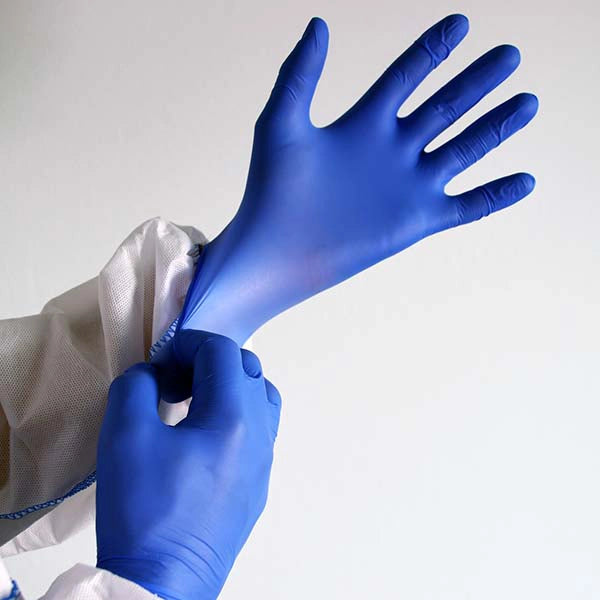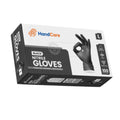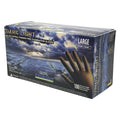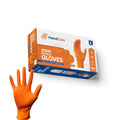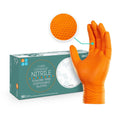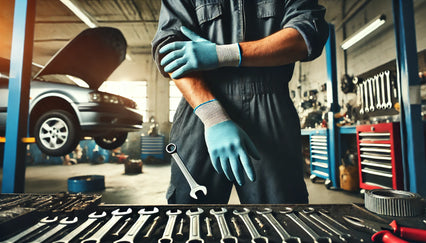As a mechanic, your hands are your most valuable tools. You rely on them to perform intricate tasks, handle heavy equipment, and work with potentially hazardous materials.
That's where mechanic gloves come in. They provide a crucial layer of protection, ensuring your hands stay safe and functional, no matter what challenges you face under the hood.
In this guide, we'll explore the world of mechanic gloves, helping you understand their importance and how to choose the best pair for your needs.
What are Mechanic Gloves?
Mechanic gloves are specialized gloves designed to protect your hands while working on vehicles. They offer protection against cuts, abrasions, chemicals, and extreme temperatures, allowing you to work more efficiently and safely.
Mechanic gloves come in various materials, each with its own set of benefits and drawbacks.
Why Use Mechanical Gloves?
Mechanical gloves are essential for protecting hands from hazards such as sharp tools, chemicals, and abrasive materials commonly encountered in automotive, construction, and industrial work.
They enhance safety by providing a secure grip, even in oily or wet conditions, and reduce hand fatigue during repetitive tasks. Additionally, features like puncture resistance, chemical protection, and high visibility ensure both efficiency and safety, making them indispensable for professionals who rely on their hands for precision and strength.
4 Best Mechanic Gloves
1. HandCare Black Nitrile Gloves - Exam Grade, Powder Free (6 Mil)
These gloves are made from high-quality nitrile, offering both durability and flexibility. With a thickness of 6 mil, they provide strong protection against punctures, chemicals, and abrasions without sacrificing tactile sensitivity.
-
Use Cases: Ideal for tasks that require precision, such as handling small parts or performing detailed inspections. These gloves are perfect for mechanics, electricians, and automotive technicians who need to maintain a high level of dexterity while ensuring their hands are well-protected.
- Industries: Automotive repair, industrial maintenance, electrical work, and even medical or laboratory settings where chemical resistance and durability are critical.
- Benefits: These gloves offer excellent resistance to a wide range of chemicals, making them suitable for environments where you might encounter oils, solvents, or other hazardous substances. The snug fit ensures that you can perform intricate tasks with ease, while the powder-free design reduces the risk of contamination.
2. Dark Light Black Nitrile Gloves - Exam Grade, Powder Free (9 Mil)
These heavy-duty gloves are designed for maximum protection in the most challenging environments. With a 9 mil thickness, they are among the thickest disposable gloves available, offering exceptional durability and puncture resistance.👉 Shop Dark Light Nitrile Gloves and save up to 50% now
- Use Cases: Best suited for heavy-duty tasks such as working with sharp or abrasive materials, handling large tools, or engaging in extended work sessions where hand protection is a priority. They are also excellent for tasks involving contact with harsh chemicals or greasy components.
- Industries: Automotive repair, heavy machinery maintenance, construction, and manufacturing. These gloves are also popular in industries where workers regularly handle sharp objects or need to protect their hands from injury.
- Benefits: The increased thickness provides an additional layer of protection, making these gloves ideal for environments where the risk of cuts, punctures, or chemical exposure is high. Despite their thickness, they still offer a secure grip, even in oily conditions, ensuring that tools and parts can be handled safely and effectively.
3. HandCare Orange Nitrile Gloves - Powder Free (8 Mil)
These bright orange nitrile gloves are designed for high visibility and heavy-duty performance. The 8 mil thickness provides a robust barrier against punctures and chemicals while allowing for good dexterity and comfort during extended wear.👉 Shop HandCare Orange Nitrile Gloves and save up to 50% now
- Use Cases: Suitable for mechanics who need to work in low-light conditions or in environments where visibility is key. They are also ideal for situations where you need to ensure that gloves are clearly visible to enhance safety. The gloves’ chemical resistance makes them suitable for tasks involving frequent exposure to solvents, oils, and other hazardous substances.
- Industries: Automotive repair, industrial maintenance, chemical processing, and any industry where both visibility and protection are important. They are also well-suited for first responders and other professionals who require high-visibility protective gear.
- Benefits: The bright orange color ensures that the gloves are easily seen, reducing the risk of accidents in busy or low-light environments. The combination of thickness and flexibility allows for both protection and ease of movement, making them a reliable choice for a wide range of demanding tasks.
4. ASAP T-Grip Orange Nitrile Gloves - Powder Free (7 Mil)
These gloves are designed for mechanics and other professionals who need a combination of strength, comfort, and grip. With a 7 mil thickness, they provide robust protection while still allowing for flexibility and dexterity.👉 Shop ASAP T-Grip Orange Nitrile Gloves and save up to 50% now
- Use Cases: Ideal for use in environments where tools and equipment are frequently handled. The gloves’ textured surface provides enhanced grip, making them particularly useful in wet or oily conditions. They are also suitable for tasks that require repetitive hand movements, as the design minimizes hand fatigue.
- Industries: Automotive repair, industrial work, manufacturing, and any sector where handling tools and equipment is a daily requirement. These gloves are also a good choice for logistics and warehousing, where a firm grip on packages and machinery is necessary.
- Benefits: The textured grip of these gloves ensures that tools won’t slip out of your hands, even in challenging conditions. The 7 mil thickness strikes a balance between protection and dexterity, making them versatile enough for a wide range of applications. Additionally, the orange color helps improve visibility, further enhancing safety in the workplace.
Best Gloves for Auto Mechanics: A Comparison
| Glove Name | Thickness | Use Cases | Industries (Score 1 - 5) |
| HandCare Black Nitrile Gloves | 6 Mil | Precision tasks like handling small parts. | Automotive (5), Electrical (5), Industrial (4) |
| Dark Light Black Nitrile Gloves | 9 Mil | Heavy-duty tasks with sharp tools or chemicals. | Automotive (5), Construction (4), Industrial (5) |
| HandCare Orange Nitrile Gloves | 8 Mil | Low-light or high-visibility environments. | Automotive (5), Chemical (5), First Responder (4) |
| ASAP T-Grip Orange Nitrile Gloves | 7 Mil | Tool handling, repetitive movements. | Automotive (5), Logistics (5), Manufacturing (4) |
Types of Mechanic Gloves
When it comes to protecting your hands while working on vehicles, you have a variety of glove options to choose from. Each type of mechanic glove offers unique benefits and drawbacks, so it's important to select the one that best suits your specific needs.
Disposable Gloves
Disposable gloves are single-use gloves that you can discard after each task, making them a convenient and hygienic option for mechanics.
- Nitrile gloves: These gloves are made from synthetic rubber and provide excellent resistance to punctures, tears, and chemicals. They offer a snug fit and good dexterity, making them suitable for precision work.
- Latex gloves: Made from natural rubber, latex gloves are elastic and provide a good sense of touch. However, some people may have latex allergies, so it's important to consider this before choosing latex gloves.
- Vinyl gloves: These gloves are made from polyvinyl chloride (PVC) and are a cost-effective alternative to nitrile and latex gloves. While they offer less durability and dexterity, they are suitable for light-duty tasks and are latex-free.
Reusable Gloves
Reusable gloves are designed for multiple uses and offer more durability and protection than disposable gloves.
- Leather gloves: These gloves are made from animal hides and provide excellent abrasion and puncture resistance. They are ideal for heavy-duty tasks and handling sharp objects, but may not offer the best dexterity for precision work.
- Synthetic leather gloves: Made from materials like polyurethane or nylon, these gloves mimic the properties of leather while offering improved dexterity and breathability. They are a good choice for mechanics who need a balance of protection and flexibility.
- Mechanics gloves with impact protection: These gloves feature reinforced knuckles, fingers, and palms to protect your hands from impacts and crushing injuries. They are particularly useful when working with heavy equipment or in environments where there is a risk of falling objects.
Benefits of Using Mechanic Gloves
Wearing mechanic gloves offers several advantages that can make your work safer, more comfortable, and more efficient. Let's explore some of the key benefits you can expect when you choose the right pair of gloves for your needs.
Protection from Cuts and Abrasions
Working on vehicles often involves handling sharp metal edges, rough surfaces, and other hazards that can easily cause cuts and abrasions on your hands. Mechanic gloves provide a barrier between your skin and these potential dangers, reducing the risk of injuries and keeping your hands safe.
Improved Grip
Many mechanic gloves feature textured palms or fingertips that enhance your grip on tools and components. This improved grip can help you work more efficiently and reduce the risk of accidents caused by slipping tools or parts. Whether you're working with oily or greasy components or handling small, intricate parts, a secure grip is essential for getting the job done right.
Chemical Resistance
Mechanics often work with a variety of chemicals, including solvents, oils, and fluids, which can be harsh on the skin. Some mechanic gloves, particularly those made from nitrile or other synthetic materials, offer excellent resistance to these chemicals. This protection helps keep your hands safe from irritation, dryness, and other potential health issues associated with prolonged chemical exposure.
Enhanced Dexterity
Choosing mechanic gloves that fit well and are made from flexible materials can greatly improve your dexterity while working. Gloves that allow for easy movement and a good sense of touch can help you perform intricate tasks with greater precision and speed. Look for gloves that strike a balance between protection and flexibility to ensure you can work comfortably and efficiently.
What Features Should You Look for in Mechanic Gloves?
When shopping for mechanic gloves, there are several key features to consider to ensure you get the best protection, performance, and value for your needs.
Durability
Look for gloves made from high-quality, long-lasting materials like leather, synthetic leather, or reinforced nitrile. These materials can withstand the wear and tear of daily use and provide reliable protection against cuts, abrasions, and punctures. Durable gloves may cost more upfront, but they'll save you money in the long run by lasting longer and requiring fewer replacements.
Comfort and Fit
Comfort is crucial when wearing gloves for extended periods. Choose gloves that fit snugly but not too tightly, allowing for easy movement and flexibility. Look for gloves with breathable materials like cotton or mesh on the back of the hand to help keep your hands cool and dry. Some gloves also feature ergonomic designs or padded palms to reduce hand fatigue during long work sessions.
Touchscreen Compatibility
In today's digital age, many mechanics rely on touchscreen devices like smartphones or tablets for diagnosing issues or accessing repair information. Touchscreen-compatible gloves feature conductive materials on the fingertips, allowing you to use your devices without removing your gloves. This convenience can save time and hassle, especially when you need to quickly access information while working on a vehicle.
Puncture Resistance
Puncture resistance is a must-have feature for mechanic gloves, as you'll often be working with sharp objects like metal shards, wires, or tools. Look for gloves that incorporate puncture-resistant materials like Kevlar or reinforced leather in high-risk areas like the palms and fingertips. These materials can help prevent painful and potentially dangerous puncture wounds, keeping your hands safe while you work.
How to Choose the Right Mechanic Gloves
Selecting the best mechanic gloves for your needs involves considering several factors to ensure you get the protection, performance, and comfort you require.
Consider the Type of Work
The first step in choosing the right mechanic gloves is to think about the specific tasks you'll be performing. Different types of work require different levels of protection and dexterity. For example, if you're handling small, intricate parts, you'll need gloves that offer excellent tactile sensitivity and flexibility. On the other hand, if you're working with heavy machinery or sharp objects, you'll want gloves that prioritize durability and puncture resistance.
Determine the Level of Protection Needed
Assess the potential hazards you'll face in your work environment. Will you be exposed to chemicals, extreme temperatures, or abrasive surfaces? Look for gloves that offer the appropriate level of protection against these risks. Nitrile gloves provide excellent chemical resistance, while leather gloves are ideal for protecting against abrasions and heat.
Ensure Proper Fit
Gloves that are too loose or too tight can compromise your safety and productivity. Loose gloves may catch on machinery or tools, while tight gloves can restrict blood flow and cause fatigue. When trying on gloves, ensure they fit snugly but allow for easy movement and dexterity. Some gloves come in different sizes, so measure your hand and refer to the manufacturer's sizing chart to find the best fit.
Look for Gloves with Touchscreen Capability
In today's digital age, many mechanics rely on touchscreen devices for diagnostics and information. Gloves with touchscreen-compatible fingertips allow you to use your smartphone or tablet without removing your gloves, saving time and hassle. If you frequently use touchscreen devices in your work, consider investing in a pair of mechanic gloves with this feature.
What are the Best Mechanic Gloves for Dexterity?
When it comes to mechanic gloves, dexterity is a top priority. You need gloves that allow you to handle small parts, manipulate tools, and perform intricate tasks with ease. Here are some of the best options for maintaining dexterity while protecting your hands:
Best Disposable Gloves for Car Mechanics offer a balance of protection and flexibility. These single-use gloves are ideal for tasks that require frequent glove changes or when working with fluids and chemicals. They provide a barrier against grease, oil, and other contaminants while still allowing for precise movements.
Nitrile Gloves
Nitrile gloves are a popular choice among mechanics due to their durability, puncture resistance, and chemical resistance. They offer a snug fit that enhances dexterity, making it easier to handle small parts and tools. Nitrile gloves also provide excellent grip, even in oily or greasy conditions.
Synthetic Leather Gloves
Synthetic leather gloves combine the durability of leather with the flexibility and dexterity of synthetic materials. They are lightweight, breathable, and provide a good range of motion for your fingers. Synthetic leather gloves often feature reinforced palms and fingertips for added protection in high-wear areas.
Where to Buy the Best Mechanic Gloves?
In today's digital age, many diagnostic tools and reference materials are accessed via touchscreens. Mechanics gloves with touchscreen-compatible fingertips allow you to use your devices without removing your gloves. This feature saves time and maintains your workflow, while still providing the protection and dexterity you need.
Choosing the right mechanic gloves ensures safety, comfort, and efficiency while working. gloves.com offers a wide selection of high-quality mechanic gloves tailored to meet your specific needs.

